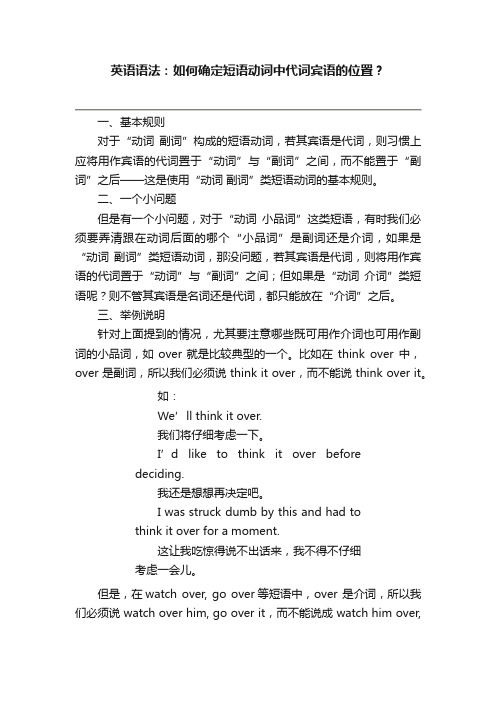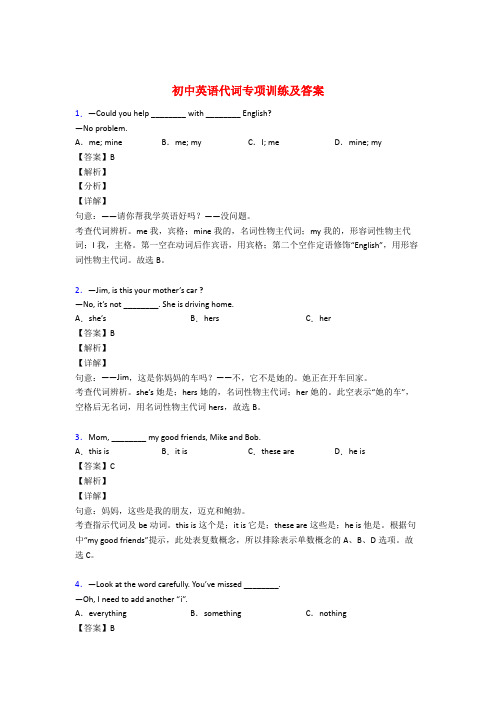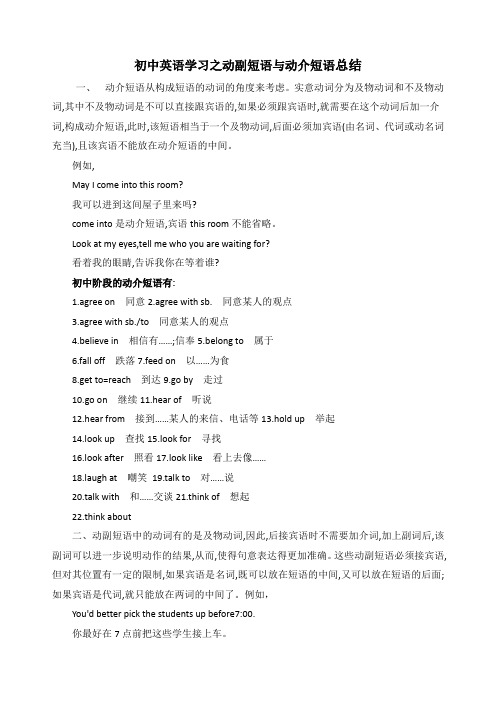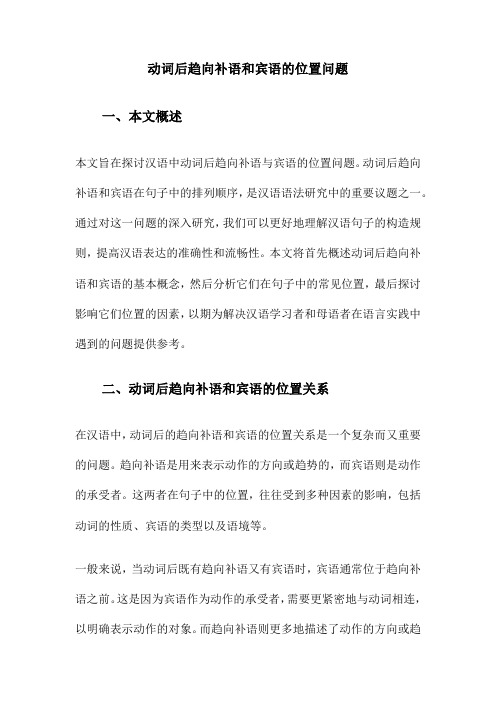动副词组宾语位置问题
动介__动副短语

英语中存在着大量由两个词构成的动词短语。
让许多同学感到困惑的是,为什么有的是动副短语,有的却是动介短语区分它们到底有什么规律可循下面就如何区分动介短语和动副短语,以及在使用上有哪些要求做一总结。
一,动介短语从构成短语的动词的角度来考虑。
实意动词分为及物动词和不及物动词,其中不及物动词是不可以直接跟宾语的,如果必须跟宾语时,就需要在这个动词后加一介词,构成动介短语,此时,该短语相当于一个及物动词,后面必须加宾语(由名词、代词或动名词充当),且该宾语不能放在动介短语的中间。
例如,May I come into this room我可以进到这间屋子里来吗come into是动介短语,宾语this room不能省略。
Look at my eyes,tell me who you are waiting for看着我的眼睛,告诉我你在等着谁初中阶段的动介短语有:1.agree on, 同意双方制定的协议条款,合同2..I can't agree on your plan3.They have agreed on the terms of surrender。
4.I agree on what you have said5.They agreed on the contract and signed their names.6..agree with sb. 同意某人的观点7.I agree with you on this point8.I don't agree with you on many things9.Do you agree with me10..agree to sb.同意对方开出的条件11.He didn't get the job because he didn't agree to the working conditions here.12.We all agreed to their arrangement.13.He agreed to help the people who are in need of help14.I agree you to go out for supper15..believe in 相信有……;信奉16.We believe in him, who is always true to his word17.I don't believe in ghosts, do you?18.I don't believe in future life.我不相信有来生19.belong to 属于20.It has belonged to our family for a long time21.It must belong to Carla22.The toy car belongs to Jane’s little brother23.fall off 跌落24.One slip and you could fall off the building脚下一滑就可能从建筑物上跌下去25.When you are learning to ride a bicycle, you often fall off.26.Leaves fall off the trees in the autumn.27..feed on 以……为食28.Birds feed on nuts and berries in the winter.29.All animals including men feed on plants or other animals.30.Birds feed on worms and grains.31..get to=reach 到达32.I'm going to be surfing bigger waves when I get to Australia!33.We'll give him a call when we get to Hongqing Street.34.I like to get to airports in good time35..go by 走过36.Oh, we will watch the clouds go by.37.As time goes by, we become better and better.38..go on 继续39.I don't want to leave, but I can't go on.40.Unemployment will go on rising for some time yet41.I'm all right here. Go on with your work42..hear of 听说43.I didn't hear of the news.44.I heard of his death last week.45.We don't know the singer, but we have heard of her.46..hear from 接到……某人的来信、电话等47.Drop us a line, it's always great to hear from you.48.I hear from my mother every month.49.I'm so glad to hear from you.50..hold up 举起51.Women hold up half of heaven52.Hold up your right hand53.Don't worry. The house will hold up54..look up 查找55.Many people have to look up the meaning of this word in the dictionary.56.to look up a number in the telephone directory57.Look up the trains to Beijing in the timetable.58..look for 寻找59.The child knelt down to look for a coin he had dropped60.They look for foods that are low in calories61.Jane craned her neck to look for her mother in the crowd62..look after 照看63.Males make the nest and look after the eggs64.She is too busy to look after her child.65.You needn't bother about coming up, I'll look after him.66..look like 看上去像……67.What did she look like?68.You look like a nice upstanding young man.69.How can I love myself when I look like thisugh at 嘲笑71.Please don't laugh at me if I can't do it well.72.Try to laugh at it instead of getting uptight73.The daring climbers laugh at danger.74..talk to 对……说75.You needn't talk to anyone if you don't want to76.Either you can talk to him, or I will.77.She would like to talk to people one to one.78.talk with 和……交谈79.I'll need to talk with you, but there's no hurry.80.I want to have a serious talk with you81.When she came in, Bob broke off his talk with Jane82..think of 想起83.I can't think of a worse way to spend my time.84.It makes me think of my lost mother.85.The police, or whoever, would not think of looking for him here.86..think about,考虑87.Give me a few hours to think about it.88.I do think about having children, maybe when I'm 40.89.There were always things to think about when she went walking90.二,动副短语中的动词有的是及物动词,因此,后接宾语时不需要加介词,加上副词后,该副词可以进一步说明动作的结果,从而,使得句意表达得更加准确。
英语语法:如何确定短语动词中代词宾语的位置?

英语语法:如何确定短语动词中代词宾语的位置?一、基本规则对于“动词副词”构成的短语动词,若其宾语是代词,则习惯上应将用作宾语的代词置于“动词”与“副词”之间,而不能置于“副词”之后——这是使用“动词副词”类短语动词的基本规则。
二、一个小问题但是有一个小问题,对于“动词小品词”这类短语,有时我们必须要弄清跟在动词后面的哪个“小品词”是副词还是介词,如果是“动词副词”类短语动词,那没问题,若其宾语是代词,则将用作宾语的代词置于“动词”与“副词”之间;但如果是“动词介词”类短语呢?则不管其宾语是名词还是代词,都只能放在“介词”之后。
三、举例说明针对上面提到的情况,尤其要注意哪些既可用作介词也可用作副词的小品词,如over就是比较典型的一个。
比如在think over 中,over 是副词,所以我们必须说 think it over,而不能说 think over it。
如:We’ll think it over.我们将仔细考虑一下。
I’d like to think it over beforedeciding.我还是想想再决定吧。
I was struck dumb by this and had tothink it over for a moment.这让我吃惊得说不出话来,我不得不仔细考虑一会儿。
但是,在watch over, go over等短语中,over 是介词,所以我们必须说 watch over him, go over it,而不能说成 watch him over,go it over。
如:There must have been an angelwatching over me that day.那天一定是有天使在保佑我。
If they don’t understand it the firsttime, go over it again until they do.如果他们第一次未弄懂,就给他们再讲,直到他们弄懂为止。
英语语法:副词位置的总结详析

英语语法:副词位置的总结详析副词是指在句子中表示行为或状态特征的词,用以修饰动词、形容词、其他副词或全句,表示时间、地点、程度、方式等概念。
一、方式副词的位置1. 置于动词或动词宾语后1)动词后He sings beautifully. 他唱的好。
She walked slowly. 她慢慢地走。
He works hard. 他工作努力。
They lived happily ever after. 他们从此过上了幸福的生活。
2)动词宾语后She gave me the book reluctantly. 她勉强地把书给我。
He spoke French well. 他的法语说的好。
She whispered the words softly into my ear. 她在我耳边细声细语的说话。
Do the work properly. 好好工作。
2. 动词与介词连用时,有“动词+介词+宾语”结构,副词可置于介词前或宾语后Look carefully at this picture. 认真看这张画。
=Look at this picture carefully.He shouted crazily at me. 他疯狂地向我大声叫嚷。
=He shouted at me crazily.They asked shamelessly for money. 他们无耻地索要钱。
They asked for money shamelessly.3. 若宾语稍长,则副词一般置于介词前Look carefully at this picture hanging on the wall. 认真看挂在墙上的这张画。
He shouted crazily at everyone walking past him. 他朝他身边走过的每个人大声叫嚷。
4. 在“动词+宾语”和“动词+介词+宾语” 结构时,若宾语较长,则副词一般置于动词前They shamelessly asked for the money we earned from hard work. 他们无耻地索要我们通过辛苦劳动赚的钱。
初中英语动介动副短语[1]
![初中英语动介动副短语[1]](https://img.taocdn.com/s3/m/05b9d3c0650e52ea541898d2.png)
动-介短语:名、代作宾语,放其后。
1.agree with同意......的意见2.listen to听......3.get to到达......4.fall off (从......)掉下5.knock at /on敲(门、窗)ugh at嘲笑7.live on靠......生活8.look after照顾,照看’.9.look at看10.look for寻找11.look like看起来像12.point at\to指示;指向13.talk about\with说话;谈话;谈论14.think about考虑15.think of认为;想起动-副短语:代词作宾语放中间,名词可放中间或后面。
be + 形容词+ 介词:其后可跟名、代、动名。
’.1.be angry with对(某人)发脾气2.be interested in对......感兴趣3.be able to能;会4.be afraid of害怕5.be amazed at对......感到惊讶6.be excited about对......感到兴奋7.be filled with用......充满8.be full of充满......的9.be good at (= do well in )擅长’.10.be late for迟到11.be made in在......生产或制造12.be made of由......组成;由......构成13.be pleased with对......感到满意D)动词+ 名词/ 代词beg one\'s pardon请原谅;对不起do morning exercises做早操do one\'s homework做作业enjoy oneself (= have a good time)’.过得快乐;玩得愉快give a concert开音乐会go boating去划船go fishing去钓鱼go hiking去徒步旅行go skating去滑冰go shopping (去)买东西have a cold (患)感冒have a cough (患)咳嗽’.have a headache (患)头痛have a try尝试;努力have a look看一看have a rest休息have a seat (= take a seat ) 就坐;坐下have sports进行体育活动have supper吃晚餐hear of听说hold a sports meeting举行运动会’.make a decision作出决定make a mistake犯错误make a noise吵闹make faces做鬼脸make friends交朋友make money赚钱take one\'s place坐某人的座位;代替某人的职务teach oneself (=learn by oneself ) 自学’.take photos照相take time花费(时间)take turns轮流watch TV看电视E)动词+ 名词/ 代词/ 副词+ 介词catch up with赶上come up with找到;提出(答案、解决办法等) get on well with与......相处融洽give birth to生(孩子)’.help yourself / yourselves to自取;随便吃make room for给......腾出地方play a joke on戏弄人;对人恶作剧speak highly of称赞say good bye to告别;告辞take an active part in积极参加take care of照顾;照料;注意F)其他类型be awake醒着的’.be born出生be busy doing忙着做...... come true实现do one\'s best尽最大努力fall asleep睡觉;入睡’.。
英语动介动副

have supper吃晚餐
hear of听说
hold a sports meeting举行运动会
make a decision作出决定
make a mistake犯错误
make a noise吵闹
make faces做鬼脸
make friends交朋友
跑开了29.rush out 冲出去30.run away 逃跑,逃走31.slow down 减缓,减速32.set off 出发,动身33.turn on/off 打开/关上34.turn up/down 调大/调小35.take out 取出36.think over 考虑37.take off 脱下,把……拿掉38.take away 拿走39.work out 算出40.write down 记下41.wash away 冲走42.wake up 唤醒
try on试穿(衣服、鞋等);试戴(帽子等)
try out试验;尝试
turn down关小;调低
turn on打开(电灯、收音机、煤气、自来水等)
turn off关(电灯、收音机、煤气、自来水等)
turn over (使)翻过来
wake up醒来
wear out把......穿旧;磨坏
1.agree on 同意2.agree with sb. 同意某人的观点3.agree with sb./to 同意某人的观点4.believe in 相信有……;信奉5.belong to 属于6.fall off 跌落7.feed on 以……为食8.get to=reach 到达9.go by 走过10.go on 继续11.hear of 听说12.hear from 接到……某人的来信、电话等13.hold up 举起14.look up 查找15.look for 寻找16.look after 照看17.look like 看上去像……ugh at 嘲笑 19.talk to 对……说20.talk with 和……交谈21.think of 想起22.think about
初中英语代词专项训练题及答案

初中英语代词专项训练及答案1.—Could you help ________ with ________ English?—No problem.A.me; mine B.me; my C.I; me D.mine; my【答案】B【解析】【分析】【详解】句意:——请你帮我学英语好吗?——没问题。
考查代词辨析。
me我,宾格;mine我的,名词性物主代词;my我的,形容词性物主代词;I我,主格。
第一空在动词后作宾语,用宾格;第二个空作定语修饰“English”,用形容词性物主代词。
故选B。
2.—Jim, is this your mother’s car ?—No, it’s not ________. She is driving home.A.she’s B.hers C.her【答案】B【解析】【详解】句意:——Jim,这是你妈妈的车吗?——不,它不是她的。
她正在开车回家。
考查代词辨析。
she’s她是;hers她的,名词性物主代词;her她的。
此空表示“她的车”,空格后无名词,用名词性物主代词hers,故选B。
3.Mom, ________ my good friends, Mike and Bob.A.this is B.it is C.these are D.he is【答案】C【解析】【详解】句意:妈妈,这些是我的朋友,迈克和鲍勃。
考查指示代词及be动词。
this is这个是;it is它是;these are这些是;he is他是。
根据句中“my good friends”提示,此处表复数概念,所以排除表示单数概念的A、B、D选项。
故选 C。
4.—Look at the word carefully. You’ve missed ________.—Oh, I need to add another “i”.A.everything B.something C.nothing【答案】B【解析】【详解】句意:——仔细看这个词。
初中英语学习之动副短语与动介短语总结

初中英语学习之动副短语与动介短语总结一、动介短语从构成短语的动词的角度来考虑。
实意动词分为及物动词和不及物动词,其中不及物动词是不可以直接跟宾语的,如果必须跟宾语时,就需要在这个动词后加一介词,构成动介短语,此时,该短语相当于一个及物动词,后面必须加宾语(由名词、代词或动名词充当),且该宾语不能放在动介短语的中间。
例如,May I come into this room?我可以进到这间屋子里来吗?come into是动介短语,宾语this room不能省略。
Look at my eyes,tell me who you are waiting for?看着我的眼睛,告诉我你在等着谁?初中阶段的动介短语有:1.agree on同意2.agree with sb.同意某人的观点3.agree with sb./to同意某人的观点4.believe in相信有……;信奉5.belong to属于6.fall off跌落7.feed on以……为食8.get to=reach到达9.go by走过10.go on继续11.hear of听说12.hear from接到……某人的来信、电话等13.hold up举起14.look up查找15.look for寻找16.look after照看17.look like看上去像……ugh at嘲笑19.talk to对……说20.talk with和……交谈21.think of想起22.think about二、动副短语中的动词有的是及物动词,因此,后接宾语时不需要加介词,加上副词后,该副词可以进一步说明动作的结果,从而,使得句意表达得更加准确。
这些动副短语必须接宾语,但对其位置有一定的限制,如果宾语是名词,既可以放在短语的中间,又可以放在短语的后面;如果宾语是代词,就只能放在两词的中间了。
例如,You'd better pick the students up before7:00.你最好在7点前把这些学生接上车。
动词后趋向补语和宾语的位置问题

动词后趋向补语和宾语的位置问题一、本文概述本文旨在探讨汉语中动词后趋向补语与宾语的位置问题。
动词后趋向补语和宾语在句子中的排列顺序,是汉语语法研究中的重要议题之一。
通过对这一问题的深入研究,我们可以更好地理解汉语句子的构造规则,提高汉语表达的准确性和流畅性。
本文将首先概述动词后趋向补语和宾语的基本概念,然后分析它们在句子中的常见位置,最后探讨影响它们位置的因素,以期为解决汉语学习者和母语者在语言实践中遇到的问题提供参考。
二、动词后趋向补语和宾语的位置关系在汉语中,动词后的趋向补语和宾语的位置关系是一个复杂而又重要的问题。
趋向补语是用来表示动作的方向或趋势的,而宾语则是动作的承受者。
这两者在句子中的位置,往往受到多种因素的影响,包括动词的性质、宾语的类型以及语境等。
一般来说,当动词后既有趋向补语又有宾语时,宾语通常位于趋向补语之前。
这是因为宾语作为动作的承受者,需要更紧密地与动词相连,以明确表示动作的对象。
而趋向补语则更多地描述了动作的方向或趋势,因此通常位于宾语之后。
然而,也有一些特殊情况需要注意。
当宾语是人称代词(如“我”“你”“他”等)时,为了强调动作的方向或趋势,有时会将趋向补语置于宾语之前。
当动词本身已经具有明确的方向性时,趋向补语的位置也可能会发生变化。
还有一些固定搭配或习惯用法中,趋向补语和宾语的位置可能会有所不同。
这些都需要我们在实际使用中加以注意和区分。
动词后趋向补语和宾语的位置关系是一个灵活而复杂的问题。
在实际使用中,我们需要根据具体语境和语法规则来判断和调整它们的位置,以确保句子的准确性和流畅性。
三、动词后趋向补语和宾语位置关系的句法分析在汉语句子中,动词后的趋向补语和宾语的位置关系是一个复杂且重要的语言现象。
趋向补语通常用来描述动词所表示动作的方向或趋势,而宾语则是动作的对象。
在句法结构上,趋向补语和宾语的位置关系直接影响到句子的意义和表达效果。
我们来看动词后趋向补语和宾语的基本位置顺序。
- 1、下载文档前请自行甄别文档内容的完整性,平台不提供额外的编辑、内容补充、找答案等附加服务。
- 2、"仅部分预览"的文档,不可在线预览部分如存在完整性等问题,可反馈申请退款(可完整预览的文档不适用该条件!)。
- 3、如文档侵犯您的权益,请联系客服反馈,我们会尽快为您处理(人工客服工作时间:9:00-18:30)。
1. 名词宾语通常位于这种短语动词之末.例如:
I am looking for my glasses.
2. 个别短语动词,其名词宾语必须放在动词和副词之间,不能放在短语动词之后.例如:
I am going to see the guests off at the airport this afternoon.
3. 对有些短语动词来说,名词宾语既可放在整个短语动词后面,也可放在动词和介词或副词之间.例如: We'll have to put off the party. 或者We'll have to put the party off.
4. 代词宾语有时位于短语动词的词尾.例如:
I am looking into it.
5. 代词宾语更常紧跟在动词之后,代词宾语的这个位置常见于下列介词或副词之前:away, down, in, off, out, up.。
